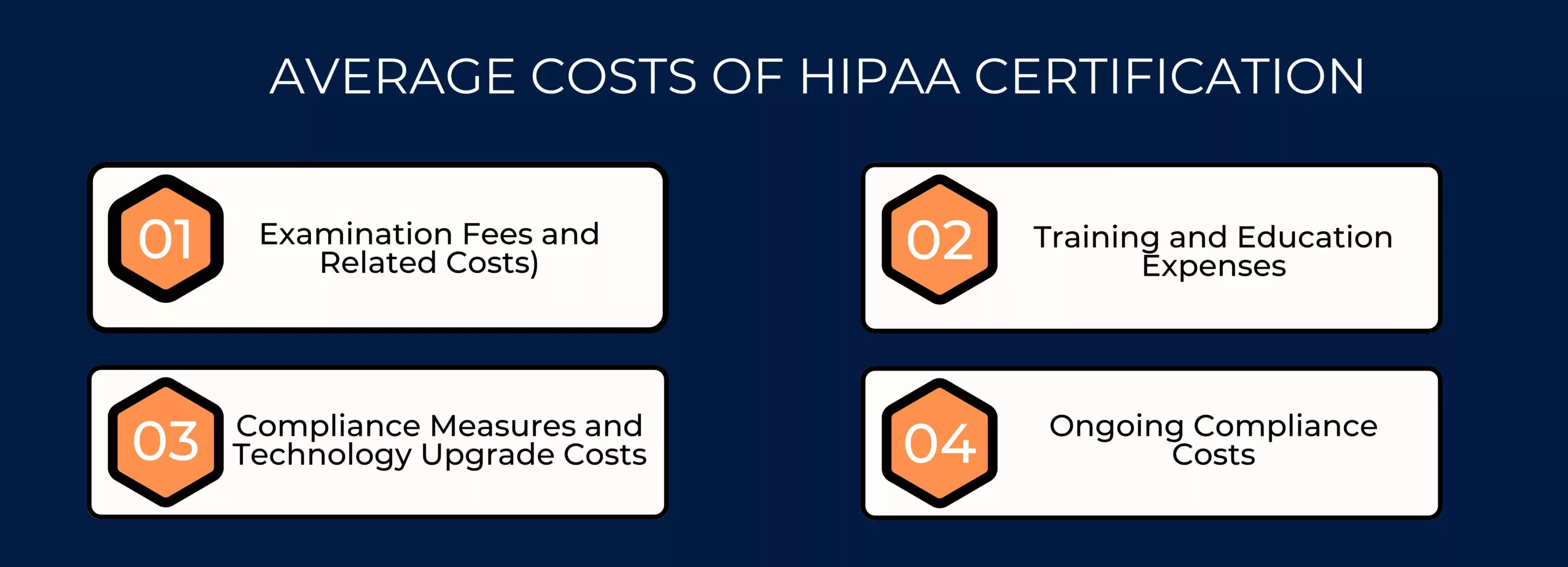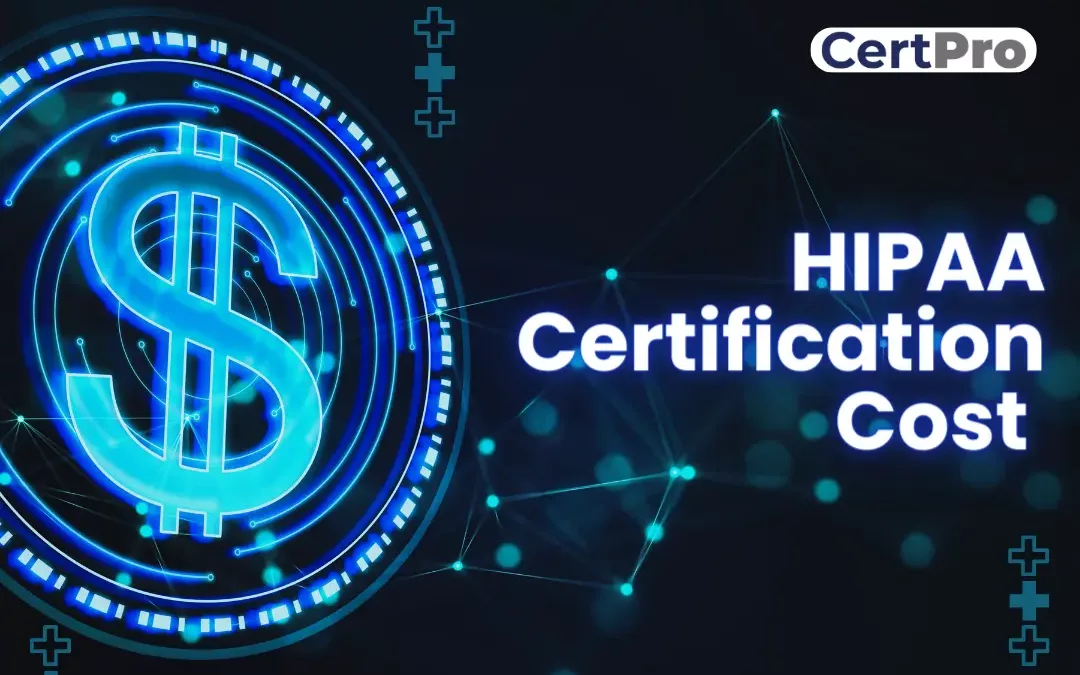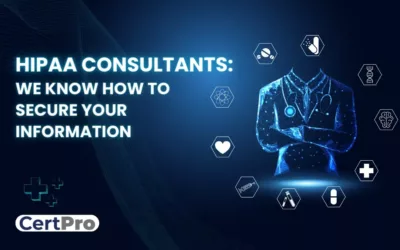The Health Insurance Portability and Accountability Act (HIPAA) is a crucial piece of legislation governing the American healthcare system. In this sense, the term “HIPAA certification” refers to the formal recognition and verification procedure used to confirm that those handling protected health information (PHI) are in compliance with the strict privacy and security standards outlined by HIPAA. The need for HIPAA certification cost cannot be overstated.
First of all, it creates a universal standard that healthcare organizations may adhere to, encouraging consistency and uniformity in protecting sensitive patient data. Additionally, HIPAA compliance cost show a dedication to moral healthcare procedures, inspiring trust in both patients and partners. Serious penalties, such as large fines and legal repercussions, can be incurred for violating HIPAA requirements.
This article will examine the intricate processes and requirements involved in obtaining HIPAA certification. It will clarify the importance of compliance in a time of more complex cyberthreats and rising worries about data privacy. The essay will also discuss the changing healthcare technology landscape and how it affects HIPAA compliance cost, highlighting the ongoing necessity for healthcare companies to modify and improve their security procedures in order to uphold the highest standards of patient data protection.
WHAT IS HIPAA CERTIFICATION?
A variety of certifications pertaining to the needs and roles in the healthcare sector are included in HIPAA certification. The Certified HIPAA Privacy Associate (CHPA), which covers fundamental privacy laws, is appropriate for beginners. For privacy and compliance officers, the Certified HIPAA Privacy Expert (CHPE) program goes deeper into privacy laws. The Certified HIPAA Security Expert (CHSE) offers a more thorough grasp of security issues, while the Certified HIPAA Security Associate (CHSA) is targeted at IT workers who are in charge of the security of electronic PHI. For those with larger duties, the Certified HIPAA Administrator (CHA) certification is excellent because it addresses both privacy and security. These certifications are critical for guaranteeing.
HIPAA compliance, which is necessary for protecting patient data and upholding faith in the healthcare system, Healthcare providers, insurers, healthcare IT businesses, business associates handling PHI, and anybody involved in healthcare operations are among the industries and groups that need to be HIPAA certified. The advantages of certification are numerous and include improved HIPAA cost knowledge and skills, decreased risk of data breaches, avoidance of expensive fines, and the capacity to show dedication to patient data security and privacy, all of which ultimately improve healthcare services and data protection standards.
FACTORS AFFECTING HIPAA CERTIFICATION COST
The cost of obtaining Health Insurance Portability and Accountability Act (HIPAA) certification can vary widely due to several factors. HIPAA certification is essential for entities handling protected health information (PHI) to demonstrate compliance with stringent privacy and security requirements. The following are key factors that affect the HIPAA cost of certification:
1. Scope of Operations: The extent of an organization’s involvement with PHI plays a significant role. Healthcare providers, health plans, and business associates all have distinct responsibilities under HIPAA.
2. Size and Structure: The size of an organization, including the number of employees and locations, influences the cost. Larger entities typically require more extensive audits, assessments, and documentation to achieve compliance.
3. Current State of Compliance: Organizations with established security and privacy practices that align with HIPAA’s requirements may find the certification process smoother and more cost-effective.
4. Risk Assessment and Gap Analysis: Conducting a comprehensive risk assessment and gap analysis to identify vulnerabilities and areas of non-compliance is crucial. The cost of these assessments can vary based on the complexity of an organization’s systems and processes.
5. Documentation and Reporting: HIPAA certification cost requires extensive documentation, from policies and procedures to incident response plans. Developing and maintaining this documentation can impact costs, especially for larger organizations with numerous processes to document.
6. Continuous Monitoring and Maintenance: Achieving HIPAA certification is not a one-time effort; it requires ongoing monitoring and maintenance. Organizations must continuously assess and update their security measures to remain compliant, which can contribute to long-term costs.
In conclusion, factors such as the organization’s size, operations, existing compliance practices, IT infrastructure, training requirements, utilization of consultants, and Continuous maintenance efforts actively influence the HIPAA cost certification.
AVERAGE COSTS OF HIPAA CERTIFICATION
Depending on a number of variables, such as the type of certification, the organization’s size and complexity, and the particular compliance requirements, the average cost of acquiring HIPAA certification might differ. The following table breaks down the average costs associated with HIPAA compliance:
- Examination Fees and Related Costs: Exam costs are a necessary component of HIPAA compliance cost Depending on the certification being sought, these fees might cost anywhere from a few hundred to over a thousand dollars per person. Study guides, practice tests, and encyclopedias are some connected expenses. These resources are frequently required to be ready for the certification tests. Although the cost of these components might vary greatly, they usually cost a few hundred dollars.
- Training and Education Expenses: Many people and businesses spend money on training courses to get ready for the HIPAA certification exam. These courses can be made available in a number of different formats, including online courses, workshops, and instructor-led training.
- Compliance Measures and Technology Upgrade Costs: Often, a variety of compliance procedures must be put in place to achieve HIPAA certification. Depending on the organization’s size and complexity, the cost of implementing these procedures varies greatly.
- Ongoing Compliance Costs: For HIPAA compliance cost to remain current with changing laws and security concerns, ongoing monitoring, audits, and upgrades are necessary. Organizations should plan for ongoing compliance costs, such as annual training and yearly risk assessments.

COST-BENEFIT ANALYSIS OF HIPAA CERTIFICATION
A cost-benefit analysis of HIPAA certification compares the costs of obtaining it to the possible savings and benefits it could provide healthcare companies. Investments are required for HIPAA certification in the form of exam fees, training expenses, and compliance requirements. However, these costs must be weighed against the significant advantages it offers:
First off, obtaining HIPAA certification cost money and acts as a preventative measure against expensive HIPAA violations. The cost of non-compliance can be far greater than the initial price of certification due to the severe penalties, legal fees, and potential civil lawsuits. Organizations can drastically lower their exposure to these financial risks by maintaining compliance.
The second benefit of certification is that it improves data security, which lowers the risk of data breaches. Data breaches incur significant costs for things like notice, investigation, and reputational harm. HIPAA offers a well-organized framework for putting in place strong security measures, reducing the risk and expenses related to data breaches.
Additionally, accreditation might boost organizational effectiveness. It encourages the creation of uniform training programs, efficient risk management techniques, and streamlined rules and processes. Over time, these reductions may lead to cost savings as well as higher-quality patient care. At the very least, HIPAA compliance will improve the standing of healthcare institutions. Patients and business partners frequently prefer to work with organizations that value data security and privacy. Increased patient trust, commercial opportunities, and competitive benefits can all result from having a solid reputation.
COST-EFFECTIVE COMPLIANCE WITH CERTPRO FOR HIPAA CERTIFICATION
Healthcare organizations would be prudent to make the investment in HIPAA compliance costs with CertPro. The financial advantages and risk reduction that come with certification far outweigh the upfront expenditures connected with examination fees, training, and compliance requirements.
In assisting enterprises with the challenges of HIPAA certification cost, CertPro also makes sure that the strictest guidelines for patient data protection are followed. Organizations can prevent the financial ramifications of HIPAA infractions, including steep fines, legal bills, and reputational damage, by proactively addressing privacy and security standards. Additionally, CertPro promotes operational effectiveness by creating streamlined policies, risk management procedures, and uniform training programs. These cost-saving efficiencies ultimately improve the organization’s overall financial stability.
Along with financial advantages, CertPro-certified businesses gain a competitive edge by winning over clients and partners who value data security and privacy. More business prospects and financial gains may result from this improved reputation.
FAQ
What factors influence the cost of HIPAA certification?
The type of certification sought, the complexity of an organization’s operations, the requirement for consulting services, technology upgrades, and ongoing compliance costs are just a few variables that might affect the price.
Are there different levels of HIPAA certification with varying costs?
There are various levels of HIPAA certification cost, from entry-level to advanced qualifications; thus, the answer is yes. Depending on the certification level, the price of training, exam fees, and resources may change.
Do organizations need to recertify, and does this involve additional costs?
Regular renewals are usually required for HIPAA certification. Exam fees, continuous training, and compliance assessments that are necessary for recertification may come at an additional expense.
What are the potential financial consequences of HIPAA violations?
The Office for Civil Rights (OCR) may impose significant financial penalties for HIPAA infractions. Depending on the seriousness of the infringement and the number of people impacted, the consequences of violations can range from thousands to millions of dollars. Financial repercussions include reputational harm, legal fees, and notification expenses.
Are there any cost-saving benefits to achieving HIPAA certification?
Yes, obtaining HIPAA certification can eventually result in cost savings. It aids businesses in avoiding expensive violations, improves data security, and fosters operational effectiveness, all of which eventually aid in long-term financial stability.

About the Author
SHREYAS SHASTHA DRUPADHA
Shreyas Shastha Drupadha, a Senior Business Consultant. Serving as an ISO 27001 Lead Auditor, Shreyas ensures the establishment of robust information security management systems. His expertise also encompasses GDPR, HIPAA, CCPA, and PIPEDA implementation.
HITECH ACT AND ITS IMPACT ON MODERN HEALTHCARE
In 2009, the Health Information Technology for Economic and Clinical Health or HITECH Act was signed to transform the American healthcare industry. The laws worked as a forward-thinking process of changing patient services. In this regard, the Patient Protection and...
BEST PRACTICES FOR DATA PROTECTION IN THE HEALTHCARE INDUSTRIES
In the healthcare sector, safeguarding sensitive information about patients is extremely important. Patient data includes personal details, medical histories, and treatment plans. Therefore, it must be protected and should be confidential. Thus, breaches not only...
HIPAA CONSULTANTS: WE KNOW HOW TO SECURE YOUR INFORMATION
Navigating HIPAA compliance can be complex; therefore, organizations seek advice from HIPAA consultants. These HIPAA experts have specific knowledge. They can help firms to understand the problematic standards of the Healthcare Privacy Act. In 1996, HIPAA was created....




